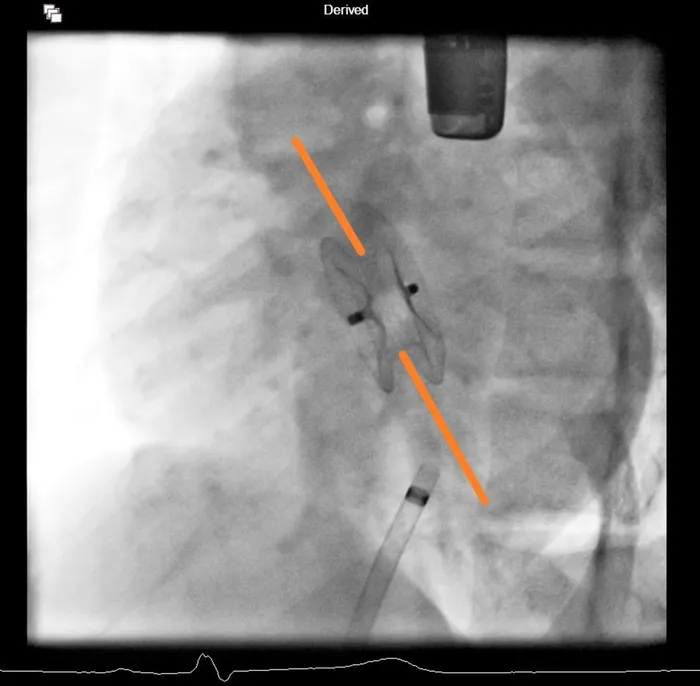
This image shows the final deployed double disc device straddling the hole in the atrial wall indicated by the orange lines
Cape Town – Congenital heart defects are being remembered this week at the Cardiology division of Tygerberg Hospital.
The awareness week is held between February 7 and February 14 worldwide.
The defects include the following: CHD, Congenital heart disease, and RHD, Rheumatic heart disease.
Laticia Pienaar, principal communications officer at Tygerberg Hospital, said according to the Centre for Disease Control, congenital heart defects occur in 1% of births in the US every year.
She added that accurate data on CHD for South Africa was lacking and many times people were unaware that they had a defect – some severe and others not threatening.
Pienaar said new technology helped with diagnoses in South Africa.
“This obviously includes a wide spectrum of disease, ranging from severe defects not compatible with life to much milder forms.
“For this reason, only about 25% require early surgery during the first year of life and the rest are treated at a later stage or remain without symptoms for decades. It is therefore very possible to have a CHD without knowing it.
“However, in some cases, this may put strain on the heart over years and when it is finally diagnosed, may already have caused significant damage to the heart.
“Accurate data on the prevalence of CHD for South Africa is lacking.”
“Another major heart condition affecting an estimated 3 million people worldwide is RHD. This is caused by a bacterial throat infection that cross reacts with the tissue of heart valves and leads to damage of the valves.
“It affects mostly younger people but because it is focused on lower income countries, there is less funding for high quality research into the prevalence. This is a major stumbling block in the management of RHD.”
Pienaar said Dr Philip Herbst of the Division of Cardiology who headed the Echo Africa projec, carried out scans at Tygerberg hospital and at schools where over 7 000 children were screened and found that there were 180 cases of RHD which had not been diagnosed and now could be treated.
“The Echo in Africa project was spearheaded by Dr Herbst in collaboration with the British Society of Echocardiography, a system developed to screen healthy school children for RHD. High quality echo (ultrasound) scans were performed both at Tygerberg Hospital and at the schools, and 7 100 children were screened.
”A total of 180 cases of RHD could be diagnosed and these children can receive treatment, but a further 60 cases of undiagnosed congenital heart defects were diagnosed. These children were then referred to appropriately: some will just be monitored, some required open heart surgery, and some could be treated with keyhole procedures,” she explained.
Dr Hellmuth Weich, acting head of the Division of Cardiology, explained how defects affected patients and their blood supply to the heart and focused on one person's case showcasing treatment using tubes inserted into the vein of a leg.
“One such patient was diagnosed with a hole in the heart between the left and right atria.
“This leads to blood from the left shunting across to the right side of the heart, leading to an increased volume of blood going through the heart and may be fatal if left untreated.
“After the diagnosis was made, she was admitted for transcatheter (via a thin tube placed in a vein or artery) closure of the defect by the team at Tygerberg.
‘A tube was inserted into her leg vein and advanced up to the right heart where the hole was identified with an ultrasound probe placed in her gullet.
“The tube was passed through the hole into the left atrium and a metal “double umbrella” device was deployed to close the hole.
“‘The first “umbrella” disc was opened in the left atrium and the device was then pulled back to straddle the defect, and the second disc was deployed in the right atrium. The device is then detached from its delivery cable and the tube removed.
“The patient can go home the same day and usually does not suffer discomfort from the procedure. This is a single success story and only a small part of the ongoing services provided by the team at Tygerberg Hospital’s Division of Cardiology.”
Weekend Argus
